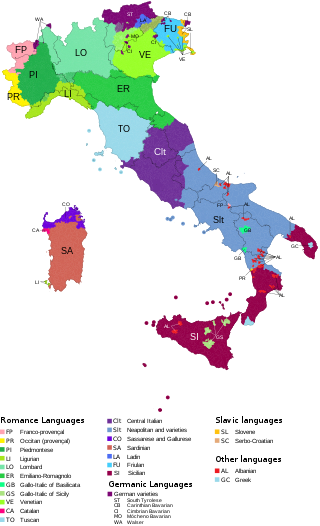
Pietro Trifone (born 1951 in Rome), is an Italian linguist.

Pietro Trifone (born 1951 in Rome), is an Italian linguist.
Trifone lectures History of Italian language at the department of Philology, linguistics and literature of the University of Rome Tor Vergata. [1] He has also led research work at the Sapienza Università di Roma, D'Annunzio University of Chieti–Pescara and Foreigners University of Siena.
With Maurizio Dardano he has written a reference grammar of the Italian language. [2] With Luca Serianni he has edited the Storia della lingua italiana in three volumes (1993-1994), with contributions by fifty scholars. [3]
His research activity embraces various fields, ranging from the analysis of grammatical structures of contemporary Italian to the history of literary and popular language, mainly with reference to the relationship between linguistic change and social life.
He also carried out studies on the following topics:
- plurilingualism of 16th century (I cantici di Fidenzio, 1981);
- language of politics (Dizionario politico popolare, 1981);
- Roman dialect and regional varieties of Italian (Roma e il Lazio, 1992; Storia linguistica di Roma, 2008; Città italiane, storie di lingue e culture, 2015);
- language of theatre (L'italiano a teatro, 2000; La lingua del teatro, 2015, first part);
- Italian language of the Renaissance (Rinascimento dal basso, 2006);
- Italian linguistic identity (Lingua e identità, 2006 new edition 2009);
- Italian "irregular" language from Dante until today (Malalingua, 2007);
- linguistic impact of national factionalism (Storia linguistica dell'Italia disunita, 2010);
- diffusion of the common Italian language (Pocoinchiostro. Storia dell'italiano comune, 2017).
From 1996 to 2004 he held the office of Rector of the Foreigners University of Siena. Currently in the University of Rome Tor Vergata he holds the position of coordinator of the PhD in Comparative Studies.
He is member of the Accademia della Crusca, of the Accademia dell'Arcadia, of the Istituto Nazionale di Studi Romani and co-director of the magazines «La lingua italiana. Storia, strutture, testi» and «Carte di viaggio. Studi di lingua e letteratura italiana». [4] [ circular reference ]
Eduardo Blasco Ferrer was a Spanish-Italian linguist and a professor at the University of Cagliari, Sardinia. He is best known as the author of several studies about the Paleo-Sardinian and Sardinian language.

Sardinian or Sard is a Romance language spoken by the Sardinians on the Western Mediterranean island of Sardinia.
Regional Italian is any regional variety of the Italian language.

Francesco de Sanctis was a leading Italian literary critic and scholar of Italian language and literature during the 19th century.

The languages of Italy include Italian, which serves as the country's national language, in its standard and regional forms, as well as numerous local and regional languages, most of which, like Italian, belong to the broader Romance group. The majority of languages often labeled as regional are distributed in a continuum across the regions' administrative boundaries, with speakers from one locale within a single region being typically aware of the features distinguishing their own variety from one of the other places nearby.
The primary languages of Calabria are the Italian language as well as regional varieties of Extreme Southern Italian and Neapolitan languages, all collectively known as Calabrian. In addition, there are speakers of the Arbëresh variety of Albanian, as well as Calabrian Greek speakers and pockets of Occitan.

Raffaele Viviani was an Italian author, playwright, actor and musician. Viviani belongs to the turn-of-the-century school of realism in Italian literature, and his works touch on seamier elements of the lives of the poor in Naples of that period, such as petty crime and prostitution. Critics have termed Viviani "an autodidact realist", meaning that he acquired his skills through personal experience and not academic education.

Gianfranco Pasquino is an Italian political scientist. Professor Emeritus of Political Science at the University of Bologna and Senior Adjunct Professor at SAIS-Europe (Bologna). He studied at the University of Turin under Norberto Bobbio and specialized under Giovanni Sartori at the University of Florence. In his professional life, he has been associated with the University of Florence, Harvard University, University of California, Los Angeles and the School of Advanced International Studies in Washington, DC and Fellow of Christchurch and St Antony's at Oxford and Life Fellow of Claire Hall, Cambridge.
Carla Bazzanella was an Italian linguist.

Giacomo Devoto was an Italian historical linguist and one of the greatest exponents of the twentieth century of the discipline. He was born in Genoa and died in Florence.
Luca Serianni was an Italian linguist and philologist.
Lorenzo Renzi, Italian linguist and philologist.
Maria Luisa Altieri Biagi was an Italian scholar and writer.
Maurizio Trifone is an Italian linguist and lexicographer.
Emidio De Felice was an Italian linguist and lexicographer.
Nicoletta Maraschio is an academic teacher of "History of Italian Language" at University of Florence. She was the first woman in charge of Accademia della Crusca, from 2008 to 2014, succeeding Francesco Sabatini.
Gianfranco Folena was an Italian linguist, philologist, and academic.
The Commodilla catacomb inscription is found on the cornice of a fresco in the tomb of the Christian martyrs Felix and Adauctus, located in the catacombs of Commodilla in Rome. The graffito has an important place in the history of Italian, as it represents a form of language intermediate between Latin and Old Italian.

Anna Giacalone Ramat, born Anna Giacalone in Forlì, Italy, 17 June 1937, is an Italian linguist known for her work on grammaticalization and language acquisition.
Giacomo Todeschini is an Italian historian, medievalist, specialized in history of economic thought.